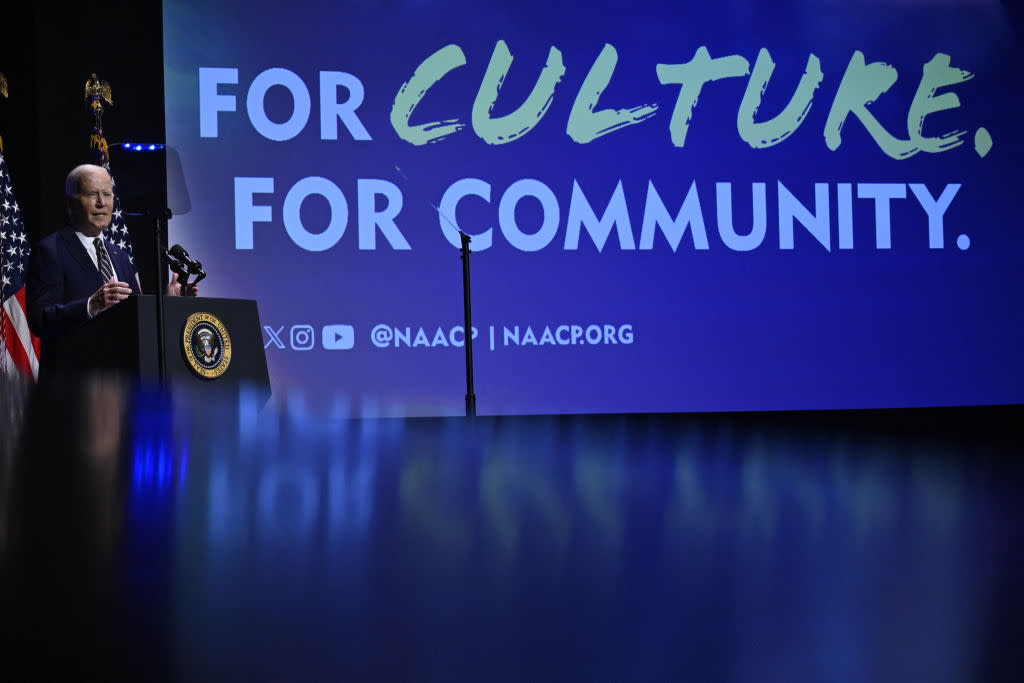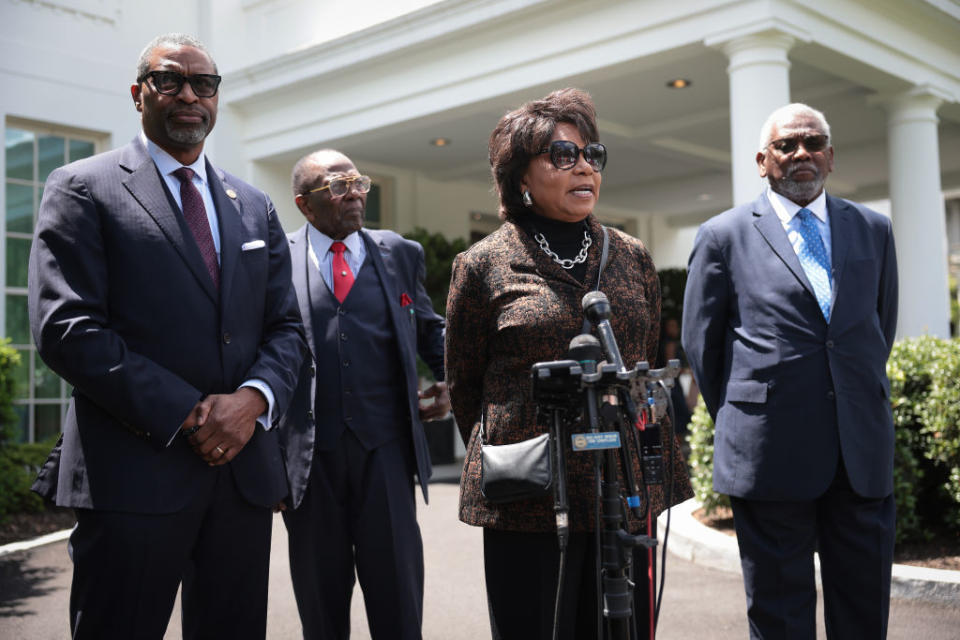Battle for racial equality persists as Biden commemorates 70th anniversary of Brown v. Board

- Oops!Something went wrong.Please try again later.
- Oops!Something went wrong.Please try again later.
- Oops!Something went wrong.Please try again later.
- Oops!Something went wrong.Please try again later.
“We know 70 years after Brown v. Board, there are some forces trying to deny freedom of opportunity for all Americans,” President Joe Biden said at the National Museum of African American History and Culture.
As President Joe Biden commemorated the 70th anniversary of the landmark ruling in Brown v. Board of Education of Topeka this week with a series of engagements, his administration — along with a host of experts, advocates and lawmakers — acknowledges that progress has slowed in racial equity in education.
On Thursday, the president held a White House meeting with the families of the plaintiffs in the 1954 Supreme Court ruling that ended the “separate but equal” legal doctrine and ordered the desegregation of U.S. public schools. On Friday, Biden delivered a speech at the National Museum of African American History and Culture for an NAACP event marking the anniversary.
The president, who also met with the Little Rock Nine ahead of his speech on Friday, said, “The Brown decision proves a simple idea: We learn better when we learn together.” However, he added, “We know 70 years after Brown v. Board, there are some forces trying to deny freedom of opportunity for all Americans.”
During his White House convening, Biden thanked the families of the Brown case plaintiffs for their “sacrifice,” Cheryl Brown Henderson, the daughter of Oliver L. Brown, the lead plaintiff in Brown v. Board, told reporters outside the West Wing on Thursday.
“He recognized that back in the ’50s and the ’40s, when Jim Crow was still running rampant, that the folks that you see here were taking a risk when they signed on to be part of this case,” Brown Henderson said. However, she acknowledged that the fight to ensure equal access to quality education for Black and brown students is ongoing.
“We’re still fighting the battle over whose children do we invest in. Anytime we can talk about failing, underfunded public schools, there is a problem,” said Brown Henderson. “There should be no such thing. Public institutions, where most of us got our education, should be world-class educational institutions.”

Dr. Mary Frances Berry, former chair of the U.S. Commission on Civil Rights and the first Black chancellor of a major university, told theGrio the Brown v. Board decision was good “on principle,” but “the principle has never been reality.”
“If we just had to look at the schools,” she said, “and say how much progress has everybody made, we would be in despair.”
The University of Pennsylvania professor of history bemoaned that significant segregation remains in U.S. schools – in fact, data suggests it’s surging – and that the school-to-prison pipeline remains a reality Dr. Berry believes most leaders are not talking about.
“If you looked at the data on incarceration rates, they’ve all gone up again,” she maintained.
NAACP President Derrick Johnson, who also attended Thursday’s White House meeting, lamented that America has “yet to fulfill the promise of Brown.” He also decried the “multiple states across the country” that are not adequately teaching Black history.
Johnson, whose organization’s former chief legal counsel — and future U.S. Supreme Court justice — Thurgood Marshall litigated the Brown case, noted that the NAACP recently filed a lawsuit against the state of Arkansas because “the history by which we’re standing here today is being denied to be taught as Advanced Placement classes.”
“There’s much more work to do,” he said.
The White House on Friday released a memo acknowledging that current racial achievement gaps are a result of Black and Latino students receiving fewer resources, and segregation between Black and white students increased by 64% since 1988 in the nation’s 100 largest districts.
The Biden-Harris administration highlighted new actions it is taking to address racial disparities in education, including $20 million in magnet school grants to attract students of color, establishing a technical assistance center to help school districts provide more “equitable and adequate approaches to school funding,” and launching an interagency process to “develop new actions by the Federal Government to preserve African American history.”
Despite persistent racial inequality in education, there are symbols of hope and examples of what the future of U.S. public schools could look like. In Topeka, Kansas — where the Brown v. Board case was initially litigated — the public school system has diversified considerably and is the most diverse district in the state of Kansas. Thirty-five percent of the district is white, 34% is Hispanic, and 18% is Black. The school system also has a 92% graduation rate.
Dr. Tiffany Anderson, the first Black superintendent of Topeka Public Schools, credits the progress in Topeka to the district’s embracing of diversity and a commitment to “remove fear.” Anderson told theGrio: “We really dive into discussions and spaces that sometimes people find are challenging discussions.”
Topeka Public Schools established a racial equity council, which Anderson co-chairs. The school system notably provides an array of services that address challenges students and families face outside of the classroom, including those related to mental health, medical care, homelessness and financial hardship.

The school district also sought to address the prison-to-school pipeline by deploying staff to mentor and visit the city’s juvenile correctional facility. The goal, Anderson told theGrio, is to ensure that public school administrators learn more about the challenges youth face. As a result, Topeka was able to reduce its rate of homelessness among its student population.
“The urgency to change has to come from within the community and within the school,” said Anderson, who encouraged educators and school district leaders to “lean into that discomfort and remove that fear [and] barrier by being as transparent as you can with bringing history to life.” She said there is a “desire to exclude” Black history and ban books because people “are afraid of the history that they don’t know and the stories they think will be told.”
Dr. Berry said the Brown decision’s most important aspect was its role in creating “reverberations throughout society,” including the broader civil rights movement that followed. However, she bemoaned the banning and censoring of Black history in classrooms as a burgeoning movement following the Supreme Court’s ruling last year that ended race-based college admissions.
Though the Biden administration had made clear to schools and businesses that the high court’s ruling on affirmative action was a narrow one that does not apply to other sectors of society, such as businesses, a number of diversity, equity and inclusion programs have been scrapped, and a series of lawsuits have challenged equity programs designed to close racial disparity gaps.
When asked if Biden was leaning in enough on what many see as an anti-equity movement, Stephen Benjamin, director of the White House Office of Public Engagement, told theGrio the president is “unapologetic” about the “principle of equity being a core value” of his administration.
“He’s not stepping back on his commitment to equity and continues to lean in,” said Benjamin, “and expects his administration to do the same.”
Recommended Stories
More must-reads:

